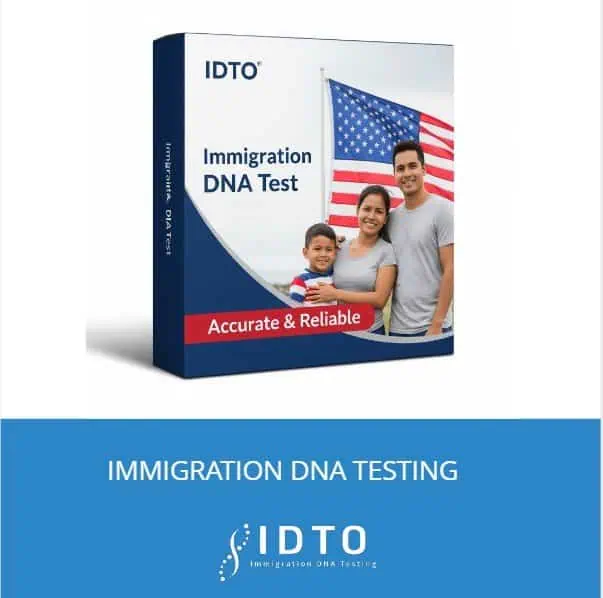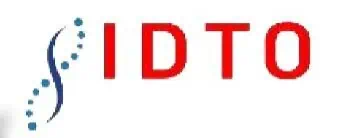US IMMIGRATION DNA TESTING

Family Reunification DNA Testing Process
The journey towards family reunification can be an emotional and time-consuming process. We understand the difficulties of being separated from your loved ones and navigating the complex immigration system.
When petitioning for a family member, you may lack sufficient evidence for your immigrant visa (IV) application. Below is an overview of the DNA testing evidence submission process:
How much does a DNA Immigration Testing cost?
Immigration Services Fees:
The cost of an immigration DNA test starts at $525.00. Several factors can influence the final price of your DNA test:
- The number of people involved in the test.
- The location of the beneficiary, especially if they live in different states or another country.
- Sample collection fees are not included in the cost of test.
To begin the process, please call 888-204-0583 to schedule an appointment.
What is Immigration DNA Testing?
An Immigration DNA Test is a chain of custody testing option used by a petitioner to prove a biological relationship, typically between a parent and child (paternity and maternity), a grandparent and grandchild or between siblings.
Common Reasons DNA testing is performed for USCIS Purposes:
These types of tests are utilized for immigration cases to support claims of familial relationships. It’s important to note that DNA testing services are not mandatory for immigration processes. Opting for a genetic test does not guarantee that an immigration agency will grant your visa.
All DNA samples submitted to the laboratory will be tested between 18 to 24 genetic markers. We recommend that you contact our office at 888-204-0583 for a free phone consultation for information about the testing process.
Is DNA testing performed by an AABB accredited laboratory?
All DNA samples are tested and analyzed by our partner AABB accredited DNA testing laboratory. The laboratory’s accreditation ensures that your results will be recognized by all immigration agencies.
We recommend that you contact our office at 888-204-0583 for a free phone consultation for information about the testing process.
When is DNA testing required during immigrant visa process?
DNA testing for immigration is not mandatory but is often suggested by the U.S. Citizenship and Immigration Services (USCIS) or a U.S. embassy when there is a need to establish a biological relationship that cannot be proven through standard documentation. This suggestion typically occurs upon receiving a Request for Evidence (RFE) letter.
Once you receive the RFE letter, you may choose to perform DNA testing as part of your evidence submission. Conducting a DNA test before receiving the RFE might impact your case’s status negatively.
It’s recommended that you adhere to USCIS guidelines and wait for the RFE letter before proceeding with DNA testing.
DNA Relationship Testing Process Overview:
Below is a brief overview of the DNA relationship testing process for visa applicant.
- A Request For Evidence (RFE) letter from USCIS, U.S. Embassy/Consulate, or U.S. Passport Agency must be received before genetic testing begins.
- Standard legal genetic testing without an RFE letter will not meet evidence submission requirements. Additional testing becomes necessary for compliance.
- Contact us at 888-204-0583 after receiving your RFE letter. Our partner laboratory will initiate your case.
- U.S.-based petitioners receive local appointments. The lab ships DNA kits to relevant Embassies/Consulates.
- Embassy officials manage international DNA collections. Your will family receive appointment details directly from the Embassy.
- Embassies coordinate beneficiary DNA sample collection appointments abroad.
- When the laboratory receives all samples they will be tested and analyzes samples. Results go to both the requesting immigration office and your home.
Inside The United States:
All DNA specimen collection for the participants located in the United States will be handled by our partner laboratory. Once the lab performs your case initiation, the coordination of our DNA specimen collection will be scheduled at facility near your home.
Outside The United States:
DNA specimen collections performed abroad will be handled and supervised by the U.S. embassy or consulate for U.S. passport, immigrant visa or Consular Report Of Birth Abroad (CRBA) cases. Our partner lab will ship the DNA kit to the U.S. embassy or consulate after the petitioner’s DNA sample has been collected in the U.S.
Please note neither petitioners nor beneficiaries cannot directly receive test kits. All DNA specimens are collected via buccal swabs.
Where can I get a DNA Test for immigration?
Call 888-204-0583 to schedule or to learn more about scheduling an appointment near a city near you. Below is a states we offer services.
DNA Testing Locations By State
DNA Testing Countries We Service
| Geographic Location | Region/Area | Countries |
|---|---|---|
| North America | Caribbean | Antigua and Barbuda; Anguilla; Aruba; Bahamas; Barbados; British Virgin Islands; Cayman Islands; Dominica; Dominican Republic; Grenada; Guadeloupe; Haiti; Jamaica; Montserrat; Puerto Rico; Saint Kitts & Nevis; Saint Lucia; Saint Martin; Saint Vincent; Trinidad & Tobago; Turks & Caicos Islands; US Virgin Islands |
| North America | Central America | Belize; Costa Rica; El Salvador; Guatemala; Honduras; Nicaragua; Panama |
| North America | North American Mainland | Canada; Mexico; United States |
| South America | Argentina; Bolivia; Brazil; Chile; Colombia; Ecuador; French Guiana; Guyana; Paraguay; Peru; Suriname; Uruguay; Venezuela | |
| Europe | Western Europe | Austria; Belgium; Denmark; Finland; France; Germany; Ireland; Liechtenstein; Luxembourg; Monaco; Netherlands; Netherlands Antilles; Azores; Portugal; Spain; Switzerland; United Kingdom; Vatican City |
| Europe | Eastern Europe | Albania; Belarus; Bosnia & Herzegovina; Bulgaria; Croatia; Czech Republic; Estonia; Georgia; Hungary; Kosovo; Latvia; Lithuania; Macedonia; Moldova; Montenegro; Poland; Romania; Russia; Serbia; Slovakia; Slovenia; Ukraine |
| Asia | Central Asia | Afghanistan; Kazakhstan; Kyrgyzstan; Tajikistan; Turkmenistan; Uzbekistan |
| Asia | East Asia | China; Japan; Mongolia; Okinawa; South Korea; Taiwan |
| Asia | Middle East | Armenia; Azerbaijan; Bahrain; Cyprus; Iraq; Israel; Jordan; Kuwait; Lebanon; Oman; Palestine; Qatar; Saudi Arabia; Syria; Turkey; United Arab Emirates; Yemen |
| Asia | South Asia | Bangladesh; Bhutan; India; Maldives; Nepal; Pakistan; Sri Lanka |
| Asia | Southeast Asia | Brunei; Cambodia; Indonesia; Laos; Malaysia; Myanmar; Philippines; Saipan; Singapore; Thailand; Timor-Leste; Vietnam |
| Oceania | Polynesia | Cook Islands; French Polynesia; Samoa; Tonga; Wallis & Futuna |
| Oceania | Melanesia | Fiji; Marshall Islands; Micronesia; New Zealand; Palau (Republic of); Papua New Guinea; Vanuatu |
| Africa | North Africa | Algeria; Egypt; Morocco |
| Africa | West Africa | Benin; Burkina Faso; Cape Verde; Côte d’Ivoire; Gambia; Ghana; Guinea; Guinea-Bissau; Liberia; Mali; Mauritania; Niger; Senegal; Sierra Leone; Togo |
| Africa | East Africa | Burundi; Djibouti; Eritrea; Ethiopia; Kenya; Lesotho; Madagascar; Malawi; Mauritius; Mozambique; Rwanda; Seychelles; Somalia; South Sudan; Tanzania; Uganda; Zambia; Zimbabwe |
| Africa | Central Africa | Cameroon; Central African Republic; Chad; Congo (Democratic Republic); Congo (Republic of); Equatorial Guinea; Gabon |
| Africa | Southern Africa | Botswana; Namibia; Reunion Island; South Africa; Swaziland |
What is the method DNA sample collection?
The standard method of DNA sample collection is performed by cheek swab. Blood sample collections have the same accuracy as a cheek swab sample. This collection method is more invasive, more expensive and painful.
What do I need to bring my sample collection appointment?
Once your appointment date and time are coordinated. The petitioner will be instructed to provide the following:
- Update state-issued identification (drivers license/passport)
- Sample collection fee to be paid directly to facility.
Frequently Asked Questions
How long does immigration DNA test take?
Results are completed within 3 business days from the date all genetic samples arrive at the lab.
International immigration DNA testing cases have longer a turnaround time of 8 weeks on average sometimes longer depending on the embassy or consulate’s workload.
How will Immigration results be submitted to USCIS or U.S. Consulate?
The laboratory will send your DNA results directly to the requesting USCIS office, U.S. Embassies or U.S. Passport Agency, an additional copy will be sent to your home.
Please note, immigration test results will not be accepted from the petitioner or beneficiary directly. Immigration agencies will only accept DNA results directly from the accredited laboratories.
Can DNA testing be performed prior to a USCIS office additional evidence request?
DNA testing for immigration purposes can only be conducted following a I-130 Request for Evidence (RFE) letter from USCIS or the relevant consular office, as they require specific protocols and AABB accredited laboratories.
Current guidelines mandate waiting for official instructions to ensure test validity and proper chain of custody. Proceeding with DNA testing before an RFE request may not be accepted by USCIS, for immigration cases.

